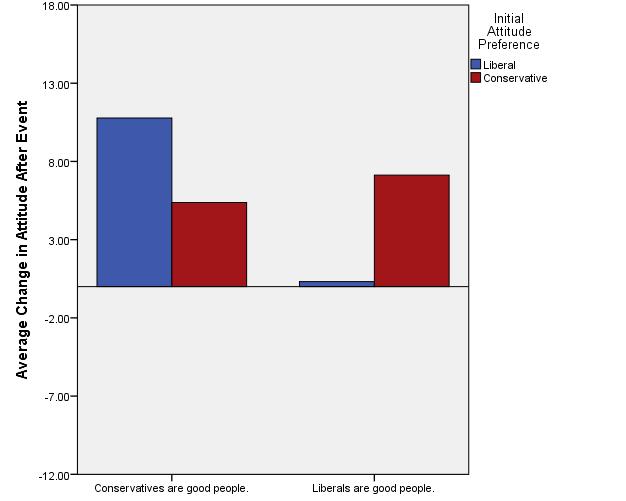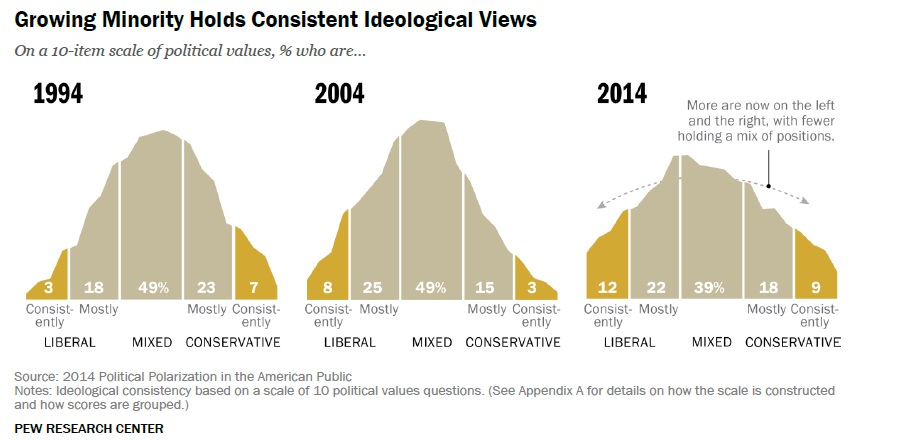Politics is fundamentally a group phenomenon that should be examined in relation to person’s identification with a particular group label (see Allport, 1954). When a person identifies as a “conservative” or “liberal” it means that he or she not only assumes a particular set of political positions but also identifies with other partisans as well as the shared sense of reality implied therein (Devine, 2014; see also Jost, Ledgerwood, & Hardin, 2008). To define oneself in this way often implies the identification of opponents, rivals or even enemies (cf. Edelman, 1988) that, at increasing levels, becomes a means of further clarifying what it means to be a “conservative” or a “liberal.”
“Civility,” which is the concern of this group, should therefore be examined as an intergroup, rather than interpersonal matter. What, then, does research on intergroup relations have to say about increasing civility among political partisans? I would argue that the greatest threat to political civility within a stable democracy is the “moralizing” of political discourse as it pertains to political groups. Namely, it is one thing to view your political opponent as misguided or simply wrong; it is another thing entirely to view him/her and the group that he/she represents as immoral, transgressive, or just plain evil. When placed in the latter realm, political discourse becomes decidedly less civil as the concept of “loyal opposition” becomes not only oxymoronic, but tantamount to treason.

Why must we as social scientists, practitioners, and scholars be wary when political discourse becomes moralized? The simple answer is that morality is powerful. The capacity for moral judgment and moral action may be encoded into our very fiber as a species and may have been the building blocks upon which human civilization was founded (Haidt, 2007, 2012; Greene, 2013). Putting aside the ontology of human morality, a much more parsimonious reason, at least for my purposes, for why morality is powerful is that people tend to view moral values as being objectively true (Goodwin & Darley, 2008). That is, a moral statement (e.g., “It is wrong to kill.”) is perceived to be more like an empirically verifiable fact (e.g., “The Earth revolves around the Sun.”) and less like a statement of social convention (e.g., “An appropriate tip for your server is 15 to 20 percent of the bill.”).
And there’s the rub, so to speak. A person’s morality is rooted in beliefs that are perceived to be as true as the Earth revolves around the Sun and which also imply a proscriptive element: not only is it wrong to kill, but one ought not to kill. A person’s moral worldview not only describes social reality but also guides future behavior as well as how future behavior is to be evaluated. One only needs to consult the work of Linda Skitka on moral conviction (see Skitka, 2010) or Jeremy Ginges’ work on sacred values (e.g., Atran & Ginges, 2012; Ginges & Atran, 2011) to see how these aspects of morality function in politics. What their work demonstrates is that we often judge the actions of others in relation to whether they reflect or confirm our moral values, even if violates considerations of procedural justice (Skitka & Houston, 2001) or our own utilitarian benefit (Ginges & Atran, 2011).
The “moralizing” of intergroup relations is often reflected in the attribution of moral or immoral qualities to other groups. I am currently examining the consequences of this process as part of my dissertation. In my preliminary findings (see Pilecki et al., 2013), I have found that when people perceive that members of another group (e.g., liberals, conservatives, feminists, evangelicals, etc.) as being typically less moral than most other people they are more likely to view violence or acts of political repression towards that group as being appropriate. These findings reinforce previous empirical and theoretical work by Susan Opotow (1990, 1993, 1994) and others (e.g., Bar-Tal, 1990) on the “scope of justice,” which refers to the distinction that people make between those considered worthy of moral treatment and those considered unworthy of moral treatment. When a social group is imbued with immoral qualities by political leaders, pundits, or other “entrepreneurs of identity” (Reicher & Hopkins, 2001) that group is effectively set apart from others and, in effect, becomes a legitimate and morally justifiable target of harm rather than civil discussion.
When people moralize intergroup relations they limit the potential for civil discourse to emerge as they frame political issues within the realm of sacred values, thereby making trade-offs and compromises less likely (Tetlock, 2003; Tetlock, Kristel, Elson, Green & Lerner, 2000). The words and labels we use to describe the social groups with which we identify and those that we oppose shape how we think about us, them and how we relate to one another (see Hammack & Pilecki, 2012). In other words, language matters and it is therefore incumbent for social scientists and practitioners to hold political leaders, media figures and other influential people accountable for their use of moralizing rhetoric to mobilize support, gain more viewers, and/or delegitimize criticism.
 evidence that telling large groups of people to be more civil has any value. There is both anecdotal evidence and research that suggests forcefully telling people to be more civil will backfire. Incivility and conflict involving large groups of people tends to be a function of a situational dynamic – two groups competing for a goal or a scarce resource like victory in a game or an election – that trumps any direct commandment to be more civil. The rise of Trump as a political force is an opportunity for us to practice what we preach at Civil Politics and try to understand the dynamics that give rise to the conflict we see, in the hopes of cutting it off at its source. As has been written in other places, Trump is a symptom, not a cause, and we are likely to see others follow in his footsteps whether he is elected or not. If we really want a better political dialogue, we need to understand the root causes of Trump’s appeal.
evidence that telling large groups of people to be more civil has any value. There is both anecdotal evidence and research that suggests forcefully telling people to be more civil will backfire. Incivility and conflict involving large groups of people tends to be a function of a situational dynamic – two groups competing for a goal or a scarce resource like victory in a game or an election – that trumps any direct commandment to be more civil. The rise of Trump as a political force is an opportunity for us to practice what we preach at Civil Politics and try to understand the dynamics that give rise to the conflict we see, in the hopes of cutting it off at its source. As has been written in other places, Trump is a symptom, not a cause, and we are likely to see others follow in his footsteps whether he is elected or not. If we really want a better political dialogue, we need to understand the root causes of Trump’s appeal.


